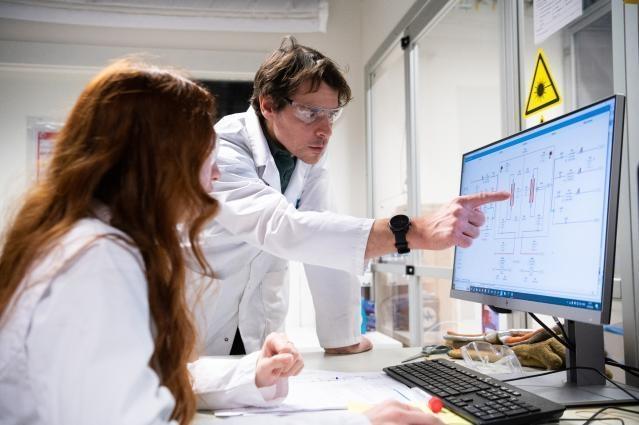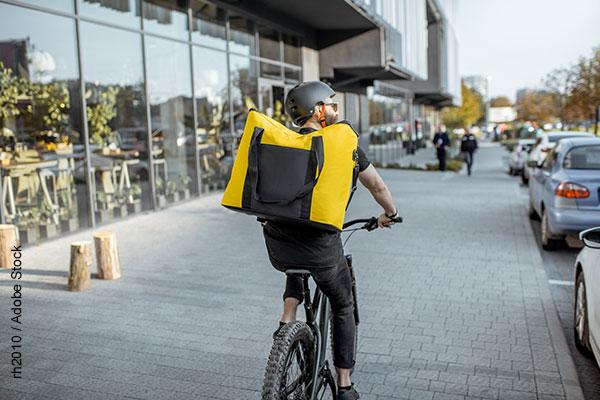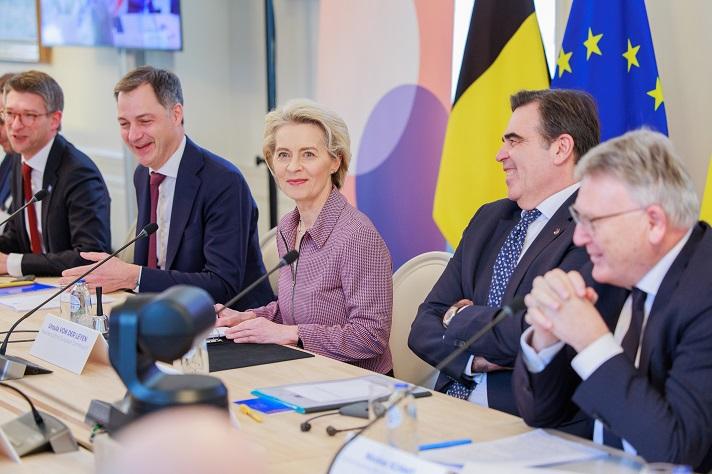A strong Social Europe is the foundation of prosperity
People and businesses in the EU can only thrive if the economy works for them. A strong Social Europe is the foundation of prosperity and well-being, and a competitive and fair economy. Skilled workers, capable of leveraging innovation and adapting to the clean and digital transitions, are key to this.
In the last four years, the European Union has faced unprecedented challenges that have profoundly impacted our jobs, education, economy, welfare systems and social life, and amplified obstacles and inequalities. Despite successive socio-economic shocks, the EU has remained resilient, with record-low unemployment rates and increasing employment, thanks to decisive action by the EU and its Member States.
The European Union is building an economy that is fair, inclusive, offers opportunities, and responds to the needs of all EU citizens.

As we overcome the pandemic, as we prepare necessary reforms and as we speed up the twin green and digital transitions, I believe it is time to also adapt the social rulebook. A rulebook which ensures solidarity between generations. A rulebook that rewards entrepreneurs who take care of their employees. Which focuses on jobs and opens up opportunities. Which puts skills, innovation, and social protection on an equal footing.
Building a fairer Europe
The European Pillar of Social Rights builds on 20 key principles and rights that are essential for ensuring fairer and better functioning labour markets and welfare systems. Its Action Plan, presented in 2021, has been our guide to turn these principles into concrete actions that benefit citizens. It focuses on:
- creating more and better jobs
- allowing people to develop skills they need to succeed
- ensuring equal access to opportunities
- combatting poverty and creating a more inclusive society
In order to continue achieving concrete and lasting results that will benefit all across the EU, the Commission has set out three key headline targets for 2030:
Source: European Pillar of Social Rights Action Plan
The leaders of the EU countries and governments committed to these three targets at the 2021 Porto Social Summit. Each EU country has presented its national contribution to achieve them.
Investing in skills and education
The clean and digital transitions are driving new skill demands in Europe. For example, the clean transition is creating new jobs in the EU in sectors like wind and solar energy, electric vehicles, and heat pumps.
Having a workforce with in-demand skills is important for long-term sustainable growth and competitiveness.
Source: European Year of Skills – Facts and figures
Despite this, labour shortages and skills gaps remain a concern. Shortages are particularly prevalent in construction, healthcare, science, technology, engineering, and mathematics. Women are under-represented in tech-related professions and studies, with only 1 in 5 ICT specialists and 1 in 3 science, technology, engineering, and mathematics (STEM) graduates being women.
To tackle these shortages and support the clean and digital transitions, 2023 was designated the European Year of Skills. This is empowering the workforce and society by addressing skills gaps in the European Union and boosting the EU skills agenda. It is also helping people get the right skills for quality jobs and support companies, particularly small and medium-sized enterprises (SMEs), in addressing skill shortages.
A key deliverable of the European Year of Skills is the action plan to tackle labour and skills shortages, presented by the Commission in March 2024. The plan sets out key measures in five areas of action that the EU, Member States, and social partners should take in the short and medium term.

In February 2019, Renata decided to completely change her life. After 13 years in a role where promotion was not an option, she left to pursue a new career: “I wanted to become a healthcare worker; however, with my background in economy, I thought it was too late to change my career path”.
Despite her initial doubts, she enrolled in the Social and Community Care Traineeship programme, which provided job-specific training. During her training, she completed a work placement at St. James’s Hospital in Dublin and was offered her dream job, using her new skills and knowledge.
The right to training and lifelong learning should be a reality for everyone across Europe, from cities to remote and rural areas. Businesses need workers with the skills required to master the clean and digital transitions, and people need to be able to get the right education and training to thrive in life.
To address the skills and education requirements, the Commission has introduced the:
Finding job opportunities for young people
Young people often struggle to find their first job. The EU helps young people secure quality jobs through funding and initiatives including the reinforced Youth Guarantee, under the Youth Employment Support package. Since 2013, around 50 million young people in Youth Guarantee programmes have secured jobs, apprenticeships, traineeships, and continued education and training.
Creating more and better jobs
Supporting citizens and businesses through the pandemic
The global pandemic took a heavy toll on people, our society, and our economy. Through economic emergency measures and initiatives to help workers and employers during the COVID-19 crisis, the Commission took immediate action and mobilised EU funding. The Commission set up the European instrument for temporary Support to mitigate Unemployment Risks in an Emergency (SURE) to help Member States protect jobs and businesses, and support citizens against the risk of unemployment and loss of income.
Thanks to SURE:
Source: SURE
Initiatives like SURE were crucial in reducing the negative economic and social impact of the pandemic, effectively protecting around 1.5 million people from unemployment in 2020, and strengthening the EU’s resilience in the face of unprecedented crises.
How people and businesses benefit from EU funding
NextGenerationEU and the Recovery and Resilience Facility (RRF) are at the heart of the EU budget, showcasing how EU spending benefits the entire European Union. These funds drive smart, sustainable, and inclusive growth by supporting entrepreneurship, competitiveness, and industrialisation.

The EU budget helps create jobs and supports projects across several areas including health, education, transport, and energy infrastructure. For example, the EU Cohesion Policy programmes are expected to create an additional 1.3 million jobs in the EU by 2027. As part of cohesion policy, the European Social Fund Plus (ESF+) is the EU’s main tool for investing in people, building a more social and inclusive Europe, and advancing the European Pillar of Social Rights. It helps shape policies related to employment, social matters, education, and skills across the EU. It also contributes to reducing social and economic disparities among Member States and regions.
EU funding is available through various funding programmes, including InvestEU, which promotes sustainable investment, innovation, and job creation. Small businesses and projects can access investment opportunities via the InvestEU Portal. Many companies across the European Union have already received funding.
Adequate minimum wages in the EU
The Commission champions a fair and liveable wage for all workers in the EU. In October 2022, the EU adopted a directive that sets up a framework to ensure adequate minimum wages across the EU while promoting collective bargaining and social dialogue. Ensuring that jobs pay an adequate wage is essential to guarantee decent working and living conditions for workers and their families, as well as to build fair and resilient economies and support inclusive growth.
Improving the working conditions of platform workers

Everyone working in the EU should enjoy the labour rights and social benefits they are entitled to. In December 2021, the Commission proposed a directive to improve the working conditions of people working through digital platforms. These new measures will help correctly determine the employment status of people working for platforms, enabling them to benefit from the labour rights they are entitled to. Additionally, the use of algorithms in human resources management will be regulated and made more transparent to ensure workers are informed about the use of automated monitoring and decision-making systems regarding their recruitment, working conditions, and earnings.
Through these new rules, the EU is committed in prioritising fairness, accountability, and the safeguarding of workers' rights in this ever-evolving digital landscape.

On 31 January 2024, the European Commission, the Belgian Presidency of the Council of the EU and European social partners signed a Declaration at the Val Duchesse Social Partners’ Summit, pledging to strengthen social dialogue in the EU.
Together, they aim to address key challenges in our economies and labour markets, focusing on tackling labour and skill shortages. Their commitments include improving working conditions, bringing more people to the labour market, and making it easier to recognise qualifications.
Ensuring equal access to opportunities
Equal pay and work-life balance
Equal pay for equal work is one of the EU’s founding principles, and tackling the gender pay gap is a key focus of the Gender Equality Strategy 2020-2025. Through EU rules on pay transparency, the EU strengthens the principle of equal pay for equal work between men and women.
The EU is also committed to supporting balance between work and private life through the Work-Life Balance Directive, which encourages equal sharing of care and work responsibilities between women and men, while also providing additional rights such as flexible working arrangements.
Source: Factsheet on new work-life balance rights
Strengthening occupational safety and health
Health and safety at work is one of the areas where the EU has had the biggest impact; good working conditions are necessary for a sustainable and healthy workforce. For the first time, the Commission has adopted an ambitious Vision Zero approach to fully eliminate work-related death in its Strategic Framework on health and safety at work 2021-2027. It puts forward five proposals to protect workers from occupational cancers and other serious diseases by significantly reducing exposure at work, for example, to asbestos and lead.
The Occupational Safety and Health Summit in May 2023 confirmed the effectiveness of the EU strategic framework on health and safety. It also identified issues of growing concern that need further considerations, such as psychosocial risks and mental health at work, and climate change effects.
Improving access to opportunities for people with disabilities

Around 87 million people in the EU have some form of disability. People with disabilities face important barriers in education, training, employment, social protection, housing, and health. While the EU has significantly contributed to improving accessibility, further progress is needed. To increase equality of opportunity in the EU, the Commission adopted a new Strategy for the rights of persons with disabilities 2021-2030. This Strategy takes into account the diversity of disability and strives to empower people with disabilities to participate fully in society and the economy.
Under the strategy, a Disability Employment Package was adopted in 2022. As only half of 42.8 million people with disabilities of working age in the EU are employed, such initiatives are providing guidance to employers and public authorities, while helping more people with disabilities access the labour market.
Following the Commission’s proposal in September 2023, the Parliament and the Council reached an agreement on the introduction of a standardised European Disability Card, as well as the enhancement of the European Parking Card for people with disabilities.
Combatting poverty and creating a more inclusive society
Adequate minimum income ensuring active inclusion
Everyone deserves to live a life in dignity at all stages of life. Poverty and social exclusion are barriers to this right and we, as a society, must find ways to overcome them. This means creating robust social safety nets that provide adequate income support to people who are in dire need of it. It also means ensuring effective access to enabling and essential services, and helping those who can work find a job. The EU adopted a Recommendation in January 2023 to support Member States in achieving these goals.
Ending homelessness
Access to affordable housing is an increasing concern across the EU. On 21 June 2021, at a high-level conference in Lisbon, European leaders launched the European Platform on Combatting Homelessness and signed the Lisbon Declaration on Combatting Homelessness to gather data and facilitate the exchange of best practices to drastically reduce homelessness.
Breaking the cycle of child poverty
No child should have to live in poverty in Europe. To ensure that children at risk of poverty and social exclusion have effective access to key services such as healthcare and education, the EU adopted the EU Strategy on the Rights of the Child and the European Child Guarantee.

The European Child Guarantee aims to break the cycle of poverty and social exclusion across generations. It will ensure that Member States guarantee free and effective access for children in need to:
- early childhood education and care
- education and school-based activities
- at least one healthy meal each school day
- healthcare
The Fund for European Aid to the Most Deprived (FEAD) is supporting vulnerable families in Ireland via the 'School Stationery Kits' initiative.
To date over 120,000 school stationery kits have been distributed to children of FEAD food aid recipients, asylum-seekers (as part of the International Refugee Protection Programme) and those in Homeless Emergency Accommodation. In 2020, the scope of the initiative was extended to ensure support for Roma and traveller families, as well as to some of inner-city Dublin’s most deprived schools.
Next steps
While there has been significant progress towards creating a more social Europe in past years, our work is not yet complete.
To ensure we keep on track, the Commission will review the European Pillar of Social Rights Action Plan in 2025. The review will allow us to work out the next steps we must take in order to achieve our 2030 targets and fully implement the principles of the European Pillar of Social Rights.
